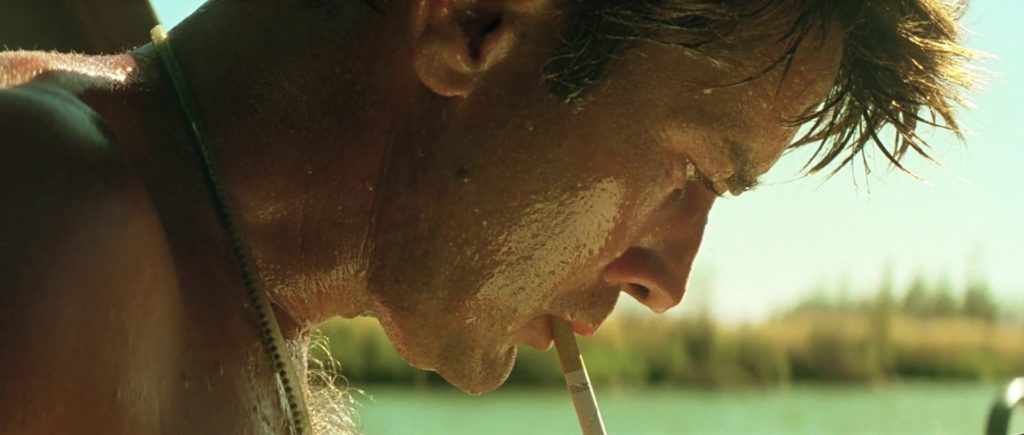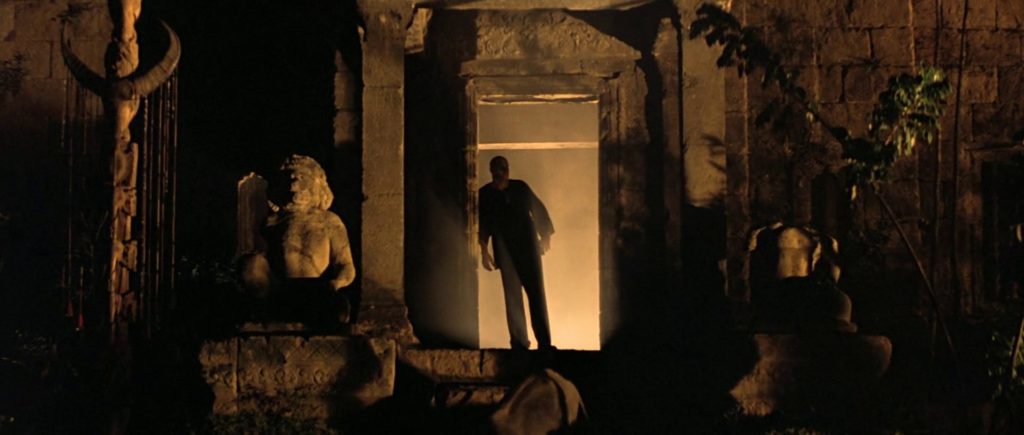(The Redux Version)
United States, 1979, 2000
Directed by Francis Coppola
With Martin Sheen (Captain Willard), Marlon Brando (Colonel Kurtz), Robert Duvall (Lieutenant Colonel Kilgore), Frederic Forrest (Private “Chef”), Sam Bottoms (Private Lance), Lawrence Fishburne (Private “Clean”), Albert Hall (Navy Boat Chief Phillips), Dennis Hopper (the photojournalist), Christian Marquand (Hubert de Marais), Aurore Clément (Roxanne Sarrault)

In the eyes of chiefs of the Unites States military in Vietnam, the apocalypse is coming under the guise of a turncoat, a Special Forces colonel launching unilateral and uncontrolled attacks from inside Cambodia against the Vietnamese Communists. He has gone crazy and thus dangerous. But maybe it is this never-ending fight which stands as the real apocalypse and maybe Colonel Kurtz has a point, if it can be deciphered this way. But the narrative is not really his own; it is the personal experience of Captain Willard, another Special Forces officer sent to terminate the renegade’s activities. The story is told by his voice and generally from his viewpoint, and the life-changing and obsessive-like nature of his confrontation with Kurtz is clearly articulated. His mission is an eye-opening rite of passage.
Over the first part of “Apocalypse Now” Kurtz is just a goal for a fresh secret mission, a topic to be learned, a presence casting a pall over a long and terrible maritime travel. A recurring motif shows a stern and sweating Willard endlessly poring over Kurtz’s dossier on the small ship bringing him beyond the border, growing acquainted at a distance with a cryptic persona whose choices in the military career bemuse. Kurtz’s scandalous statements and unorthodox moves stir Willard into deeper and darker reflections and subtly turn the turncoat into a new yardstick to assess the Vietnam War. The river sail offers various steps that, one after the other, lead Willard and his companions, Chief Philips at the helm plus Privates Lance, “Clean” and “Chef”, not only up to the North but above all down to the absurdity and horror of the war; they just move deeper and deeper into the war terrain and tragedy. Kurtz’s supposed madness doesn’t feel that exceptional at the end.
The grotesque case of surf-mad and gun-crazy Lieutenant Colonel Kilgore demonstrates how blurry the lines of rationality have become. No doubt he likes his men and knows his job and his equipment well; and he is still aware why he is fighting for and that the end of the fight is near, sounding then like a perfect epitome of the US cadres of the time and place. But his outstanding behavior belies an outlandish character, his bravery has turned into blustery and his combat flair into callow flare-ups. Is this kind of men really the right stuff to deal with this country and any war? At least he can manage troops – a better outcome for his soldiers than what befalls their colleagues in two bases down the river, left without any CO, places that have morphed into a slough of despond, rather literally in a first case, as never-ending rains drown the cantonment, and poignantly the second case, as the last US outpost before Cambodia has become a lost cause, a nightmare of a fight, where stupefied soldiers try to survive. The closer Willard goes to Kurtz, the clearer becomes the fact that he must deal with a constant worsening of realities and human abilities.
Willard also travels through time. The most unexpected section of the film takes place in a plantation still managed by the French family that set it up decades ago. The episode yields precious clues to the historical development that has led to the war, emphasizing the US responsibilities and the bitter experience Vietnam was for French politics and national identity. It is remarkable to watch how clear the explanation is, and how clear-minded the film is about that part of the Vietnamese history, though on the whole it does not spend much time with Vietnamese or their own ideological struggles, even it they are the main factor driving the war. It should be acknowledged that the national character of the conflict is too easily overlooked for the sake of the director’s purpose (it should be also noted about this French episode that some of the director’s inspiration comes from a remarkable French film about the Indochina war, “La 317ème section” [1965]).
Not unlike French landowner Hubert de Marais, Kurtz has an ideological vision of the war, bent by personal suffering. But this vision has little to do with party politics or power plays; it deals with war ethics and tactics, delving into failures and horrors to reach a ruthless and disturbing conclusion on the soldier’s nature, a schizophrenic call for men fully aware of their purpose and their environment and yet ready to act without any ethical considerations.

Absolutely unlike de Marais, Kurtz is not a lone commander to a decaying clan; he leads a strange but extended community made up of soldiers seduced by his person and vision and of indigenous tribes. He is not in a defensive position and on the contrary is amazingly quick to second-guess and attack, as Willard unfortunately finds out. And he fosters a deep sense of ambiguity. He vows to keep fighting as a US officer, but rejects the American vision of the war; he accepts to be worshiped by the natives, and yet would call for their extermination; he thrives on violence but he remains a contemplative person. The biggest ambiguity deals with his confrontation with his fellow Special Forces officer, which makes up the rather short second part of the film, the moment when Kurtz is now a physicality and no longer a distant vision and when Willard must become the real player of his fate. He has caught him but what does Kurtz want to do with Willard? This is exactly the question the zany photo reporter who has thrown in his lot with the turncoat promptly asks. The answer would mean that the US military’s goal is reached, but is hard to comprehend and open to interpretation.
At least his feelings cannot put down to bad health, as is the case of his namesake in the novella that Joseph Conrad novella published in 1899 (Marlon Brando’s Kurtz stands as a powerful and awesome force though his stolid face, intense stare and careful speech make him look like a spectral presence). Down to his last words, “The horror, the horror”, the movie is largely based on this famous depiction of the exploitation of Africa by European capitalism by a man who “followed the sea”. But it purports to turn the tough and treacherous voyage made by Marlow into an examination of a topic that divided and shocked the nation and quickly became a theme for the US filmmakers. The ideological blindness and cultural insensitivity of Francis Coppola’s fellow countrymen are clearly highlighted but the boldest move of the narrative lies in the intellectual challenge Kurtz represents. How to deal with an enemy ready to act through different technical and ethical manners? What kind of ethics and methods, indeed, can be allowed to win what seems unwinnable? However contentious are the findings of Kurtz, the discussion, steeped in the historical context the film gives, remains upsetting, leaving the audience uncomfortable. As far as Willard is concerned, the mission, which has turned him into a borderline case, is bound to leave an indelible mark on his ideas on war and men.
Willard is not really like Marlow. Marlow would not have killed at blank point a local peasant and does try to deal with Kurtz in the book. Marlow is also through and through a sound man while the film’s opening observes Willard as he stands alone in a hotel room, unable to sleep and going crazy, flailing in the buff, punching a mirror, and dead certain to go to jail when two soldiers knock at the door. The first image of the film focuses on a man whose mental balance is unstable, even though he would most of the time be clear-minded and serious. Madness lurks even before the case of Kurtz is presented, but, as the camera’s angles and lighting would suggest, there is a peculiar sense of disorientation and even delirium going on. From the mind-blowing rhythms of The Doors’ song “This is the End” to the antics of the actor (and “Easy Rider” [1969] director) Dennis Hopper, the film carries a psychedelic signature. Some supporting characters go even deeper in the hallucinatory experience, like the stoned soldiers near the Cambodian border and, of course, the opium-eating French woman who physically entertains Willard, the gorgeously mysterious Roxanne Sarrault, who briefly draws Willard into her addiction. This film doesn’t only cope with dislocation and destruction; it is an intoxicating and insane trial for the people trapped into its convoluted plot; it is a sensory and hypnotic vision for the audience, compelled by this epic and intellectual production to plumb fresh and disturbing depths in the warriors and men’s nature.
An epic it is: even compared to his previous flicks, Coppola demonstrates an ability to conceive and shoot highly choreographed scenes that genuinely impresses, starting with the ballet of choppers on the attack, blasting Richard Wagner’s music under the command of Kilgore and conveying the bitter unbalance of forces on the battleground – which, however, didn’t prevent the Vietnamese from winning. The shooting was an epic by itself; but the many hardships seemed to have been a fillip and the artistic quality hitting from the start the audience remains technically brilliant and visually gorgeous till the splendid and nocturnal finale. Thanks to the solid performance of the actors and the rigorous and forceful logic of the narrative, various episodes find their place in the flow of images flawlessly. The film is not just a series of outstanding mise en scène turns but stands as a beautiful and complex tapestry whose every narrative strand is thoroughly pursued and every artistic strand wonderfully exploited, thanks to the rich textures of the photography.
“Apocalypse Now” is a splendid spectacle, and a strikingly high-brow one. Coppola wields ideas and references with a consummate screenwriting, and directorial talent and with an amazing confidence in the ability of the audience to follow his path. It is a gripping tale of lost warriors, and at the same time it conveys strong historical and ethical ideas making this tale even more riveting. Intertextuality thrives in the unfolding of the story, as Kurtz reads lines from the poem that Thomas Stearns Eliot wrote in 1925, inspired by Conrad’s novella. “The Hollow Men” resonates even stronger than “Heart of Darkness” as Willard’s journey is a deadly journey and also a spiritual one. The quoted lines happen to be a clever allusion to the soldiers’ preposterous situation: “We are the hollow men/We are the stuffed men/Leaning together/Headpiece filled with straw. Alas!”. How easily such poetic statements naturally segue into the wider narration deeply astonishes, emphasizing the strong coherence and genuine brilliance of the director’s vision.

